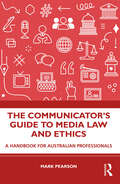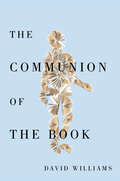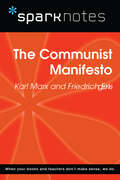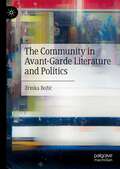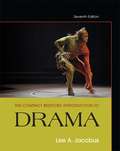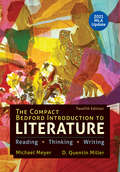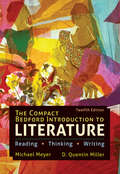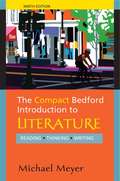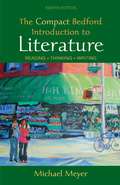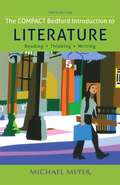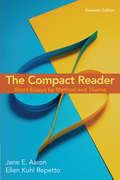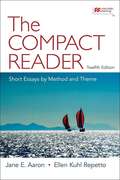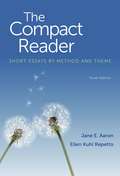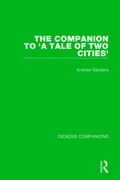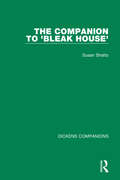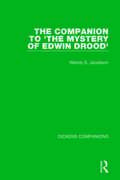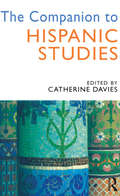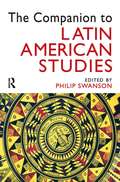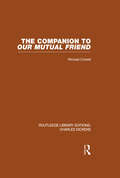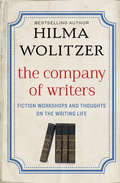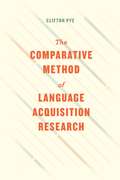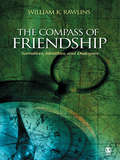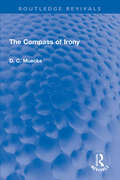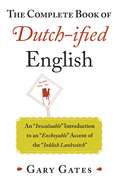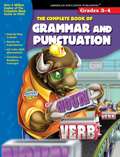- Table View
- List View
The Communicator's Guide to Media Law and Ethics: A Handbook for Australian Professionals
by Mark PearsonThis book offers an introduction to the key legal and ethical topics confronting Australian journalists and strategic communicators both at home and internationally and offers a suite of reflective techniques for navigating them. It starts by positioning morals, ethics, and the law in their historical and philosophical frameworks by tracing the evolution of free expression and professional media ethics. Media law and ethics are then contextualized in their modern international human rights framework. Readers are equipped with a skill set for reflecting on the law and ethics of professional media dilemmas – including mindful reflection, the Potter Box, journaling, concept mapping, and discussion. Such approaches are then applied to key topic areas, including free expression; reputation; confidentiality; privacy; justice; intellectual property; national security; discrimination and harassment; and conflicted interests. Each is examined in terms of its philosophical underpinnings, relationship to human rights, professional ethical context, international examples, legal principles, key Australian laws, legal cases, and strategies for applying reflective practice techniques. It concludes on a confident note – imploring communicators to engage in constructive and mindful strategic communication with the authority and confidence that results from a working knowledge of media law and ethics. This handbook is for professional communicators and students in all fields, but particularly in journalism, public relations, corporate communication, media relations, and marketing.
The Communion of the Book: Milton and the Humanist Revolution in Reading (McGill-Queen's Studies in the History of Ideas)
by David WilliamsThe modern world was not created by the civilization of Renaissance Italy, the advent of the printing press, or the marriage restrictions imposed by the medieval church. Rather, it was widespread reading that brought about most of the cognitive, psychological, and social changes that we recognize as peculiarly modern.David Williams combines book and communications history with readings of major works by Petrarch, Bruni, Valla, Reuchlin, Erasmus, Foxe, and Milton to argue that expanding literacy in the Renaissance was the impetus for modern civilization, turning a culture of arid logic and religious ceremonialism into a world of individual readers who discovered a new form of communion in the act of reading. It was not the theologians Luther and Calvin who first taught readers to become what they read, but the biblical philologist Erasmus, who encountered the divine presence on every page of the gospels. From this sacramental form of reading came other modes of humanist reading, particularly in law, history, and classics, leading to the birth of the nation-state. As literacy rates rose, readers of all backgrounds gained and embodied the distinctly modern values of liberty, free speech, toleration, individualism, self-determination, and democratic institutions. Communion and community were linked, performed in novel ways through revolutionary forms of reading. In this conclusion to a quartet of books on media change, Williams makes a compelling case for readers and acts of reading as the true drivers of social, political, and cultural modernity – and for digital media as its looming nemesis.
The Communist Manifesto (SparkNotes Philosophy Guide)
by SparkNotesThe Communist Manifesto (SparkNotes Philosophy Guide) Making the reading experience fun! SparkNotes Philosophy Guides are one-stop guides to the great works of philosophy–masterpieces that stand at the foundations of Western thought. Inside each Philosophy Guide you&’ll find insightful overviews of great philosophical works of the Western world.
The Community in Avant-Garde Literature and Politics
by Zrinka BožićThis book rethinks the concept of community taking Jean-Luc Nancy’s influential essay “La communauté désoeuvrée” as its starting point, tracing subsequent scholarship on community and adding new insights on avant-garde aesthetics and politics. Extensively exploring the communitarian dimension of avant-garde aesthetics and politics (focusing on artistic groups, intellectual circles and theoretical collectives), the author aims to bring literature and art into a philosophical examination of the paradoxical and complex idea of community.
The Compact Bedford Introduction to Drama (7th Edition)
by Lee A. JacobusOffering a carefully chosen selection of plays from the ancient Greeks to the present--including many new contemporary prize-winners--The Compact Bedford Introduction to Drama has the plays you want to teach and the features students need at a compact size. Twenty-eight chronologically arranged plays are illuminated by insightful commentaries and casebooks that enrich students' contextual understanding and encourage critical thinking.
The Compact Bedford Introduction to Literature with 2021 MLA Update: Reading, Thinking, and Writing
by Michael Meyer D. Quentin MillerThis ebook has been updated to provide you with the latest guidance on documenting sources in MLA style and follows the guidelines set forth in the MLA Handbook, 9th edition (April 2021).Become a lifelong reader and improve your writing skills as Bedford Introduction to Literature exposes you to classic and contemporary writers while thorough support and activities give you ample practice.
The Compact Bedford Introduction to Literature: Reading, Thinking, And Writing
by Michael Meyer D. MillerPACKAGE THIS TITLE WITH OUR 2016 MLA SUPPLEMENT, Documenting Sources in MLA Style (package ISBN-13: 9781319086251). Get the most recent updates on MLA citation in a convenient, 40-page resource based on The MLA Handbook, 8th Edition, with plenty of models. Browse our catalog or contact your representative for a full listing of updated titles and packages, or to request a custom ISBN. The Bedford Introduction to Literature is a best-seller for a reason: It brings literature to life for students, helping to make them lifelong readers and better writers. Classic works drawn from many periods and cultures--by the authors you love to teach--appear alongside a strong selection of today's notable writers. There is ample support for students, with a dozen chapters of critical reading and writing support, helpful sample close readings, writing assignments, and student papers. And, because everyone teaches and learns a little differently, there are lots of options for working with the literature, including case studies on individual works and themes that everyone can relate to. In-depth chapters on major authors like Flannery O'Connor and Robert Frost take students deeper into their work, and chapters on the fiction of Dagoberto Gilb and the poetry of Billy Collins and Julia Alvarez--created in collaboration with the authors themselves--are one more way that the anthology showcases literature as a living, changing art form. Featuring a new thematic case study on war fiction and a new cultural case study on John Patrick Shanley's celebrated play Doubt--a proven success in the classroom--the eleventh edition helps students draw lasting connections between the literature they read and the world around them
The Compact Bedford Introduction to Literature: Reading, Thinking, Writing
by Michael MeyerThe Compact Bedford Introduction to Literature is a best-seller for a reason: it brings literature to life for students -- helping to make them lifelong readers and better writers. Classic works from many periods and cultures exist alongside a diverse representation of today's authors. Support for students includes a dozen chapters of critical reading and writing, with plenty of sample close readings, writing assignments, and student papers. And, because everyone teaches a little differently, there are lots of options for working with the literature, including in-depth chapters on major authors and case studies on individual works and themes that everyone can relate to. New to this edition are casebooks on short fiction and the natural world and a chapter created with Billy Collins. This anthology is now available with video! Learn more about VideoCentral for Literature.
The Compact Bedford Introduction to Literature: Reading, Thinking, Writing (8th Edition)
by Michael MeyerThe Compact Bedford Introduction to Literature is designed to bring literature to life -- and to make students lifelong readers. As an instructor of literature and writing, editor Michael Meyer understands that a particular challenge in today's classroom is that students may not see literature as relevant to their lives. They may have difficulty reading it critically and lack confidence in their writing skills. With these factors in mind, Meyer has put together a lively collection of literature drawn from many periods, cultures, and voices, with an excellent representation of contemporary authors, women authors, and authors of color. These works are presented with more than a dozen chapters of critical reading and writing support, and a generous helping of sample close readings, writing assignments, and student papers. And, because everyone teaches a little differently, the book offers more options for working with the literature than any comparable anthology -- including in-depth chapters on major authors and case studies on individual works and universal themes.
The Compact Bedford Introduction to Literature: Reading, Thinking, and Writing (Tenth Edition)
by Michael MeyerLike its predecessors, the tenth edition of The Compact Bedford Introduction to Literature assumes that reading and understanding literature offers a valuable means of apprehending life in its richness and diversity. This book also reflects the hope that its selections will inspire students to become lifelong readers of imaginative literature, as well as more thoughtful and skillful writers.
The Compact Reader: Short Essays By Method And Theme (Eleventh Edition)
by Jane E. Aaron Ellen Kuhl RepettoThe Compact Reader offers an innovative dual organization; it can be taught rhetorically or thematically. Each rhetorical method is paired with an engaging thematic topic so that readings display the full range and flexibility of writing in each mode. Selections average just two or three pages in length, so that students can read them quickly, analyze them thoroughly, and emulate them successfully. A brief guide to reading and writing, detailed chapter introductions, and two final chapters on working with sources serve as a mini-rhetoric, providing students with the support they need. For instructors who want a concise, affordable, effective resource for teaching the connection between form and content, The Compact Reader is the perfect choice.
The Compact Reader: Short Essays by Method and Theme
by Jane Aaron Ellen RepettoThe Compact Reader helps you turn in better writing assignments, using brief essays on a variety of topics to focus on specific skills.
The Compact Reader: Short Essays by Method and Theme (Tenth Edition)
by Jane E. Aaron Ellen Kuhl RepettoThe Compact Reader seamlessly combines four texts--a short-essay reader, a rhetorical reader, a thematic reader, and a brief rhetoric--into one slim volume containing three dozen engaging, high-quality essays.
The Companion to 'A Tale of Two Cities' (Dickens Companions #1)
by Andrew SandersThis book, first published in 1988, reveals the great care Dickens took with the planning and preparation of A Tale of Two Cities and its roots. It also explores the aspects of Dickens’s life, especially his interest in private theatricals, which contributed to the genesis of the novel. For the first time the historical sources for the very individual account of the French Revolution presented in A Tale of Two Cities are examined, and the book investigates the novelist’s debt to French and English eye-witnesses. This Companion identifies the multitude of allusions to what Dickens often regarded as the whims of eighteenth-century justice, religion, philosophy, fashion and society. It provides the modern reader with both fundamental sources of information and a fascinating account of the creation of a complex historical novel.
The Companion to 'Bleak House' (Dickens Companions #2)
by Susan ShattoThis book, first published in 1988, is the most comprehensive annotation of Bleak House ever undertaken. It provides authoritative background information about the topical issues of the novel that interested Dickens as a social critic and activist. It also describes the novel’s literary antecedents and identifies the sources of its hundreds of literary and historical allusions. The annotation is based on a wide range of nineteenth-century sources – from newspapers, periodicals and parliamentary papers to travel guides and cookery books – and gives the modern reader unprecedented access to both Bleak House – Dickens’s tract for the times – and the period when it was written.
The Companion to 'The Mystery of Edwin Drood' (Dickens Companions #3)
by Wendy S. JacobsonThis book, first published in 1986, explores the allusions in Dickens’s work, such as current events and religious and intellectual issues, social customs, topography, costume, furniture and transportation. Together with an analysis of Dickens’s imaginative responses to his culture, and their place in the genesis and composition of the text, this book is a full-scale, thoroughgoing annotation that The Mystery of Edwin Drood requires.
The Companion to Hispanic Studies
by Catherine DaviesWhat is 'Hispanic Studies'? This companion gives a concise and accessible overview of the discipline as taught today and suggests new directions for future developments. 'Hispanic Studies' is broadly concerned with the languages and cultures of the vast 'Hispanic' world, extending chronologically from Roman Hispania to today, and geographically from Roman Hispania to today, and geographically from California in the North to Patagonia in the South, and from Majorca in the East to the Andes in the West.This essential book provides all the necessary introductory information on the subject and will be especially useful for students who have already started courses in Spanish / Hispanic Studies, or who are considering doing so in the future.Written by a team of leading scholars each with established teaching experience this collection of short essays explores topics as diverse as the history of the Spanish language, Islamic Andalusia, race and class in the Spanish Golden Age, Catalan nationalism, the Madrid 'movida', Latin America cinema, tango in Argentina, Evita Pern, 'testimonio' and the cultural significance of the US-Mexican border. The emphasis is on literature and texts, including film and photography. In addition, the book includes time-lines, summary boxes adn suggestions for further reading.
The Companion to Latin American Studies
by Philip SwansonWhat is 'Latin American Studies'? This companion gives a concise and accessible overview of the discipline. Covering a wide range of topics, from colonial cultures and identity to US Latino culture and issues of race, gender and sexuality, this book goes beyond conventional literary companions and situates Latin America in its historical, social, political, literary and cultural context. This essential book provides the key introductory information on the subject and will be especially useful for students taking or considering taking courses in Hispanic or Latin American Studies. Written by an international team of experts, each chapter supplies the necessary basic information and a sound introduction to central ideas, issues and debates. In addition to 12 chapters on the main topics in Latin American Studies, the companion includes an introduction, time chart, glossary and suggestions for further reading.
The Companion to Our Mutual Friend: Routledge Library Editions: Charles Dickens Volume 4 (Routledge Library Editions: Charles Dickens #Vol. 1)
by Michael CotsellOur Mutual Friend (1864-5) Dickens’ last completed novel, has been critically praised as a profound and troubled masterpiece, and yet is has received far less scholarly attention than his other major works. This volume is the first book-length study of the novel. It explores every aspect of Dickens’ sustained imaginative involvement with his age. In particular its original research into hitherto neglected sources reveals not only Dickens’ reactions to the important developments during the 1860s in education, finance and the administration of poverty, but also his interest in phenomena as diverse as waste collection and the Shakespeare tercentenary. The Companion to Our Mutual Friend demonstrates the varied resources of artistry that inform the novel, and it provides the reader with a fundamental source of information about one of Dickens’ most complex works.
The Company of Writers: Fiction Workshops and Thoughts on the Writing Life
by Hilma WolitzerAward-winning author Hilma Wolitzer's expert guide to navigating a life of writing through workshops and writers' groupsWhen Hilma Wolitzer finished writing her first short story, she had no idea what to do next. She didn't trust her family members to give honest critiques, and most of her friends--though they tried to be helpful--knew little about writing fiction. But her creative life changed when she attended a local writing workshop and discovered the joys of working within an artistic community. Since good workshops and conferences are often expensive or difficult to find, Wolitzer provides a guide to building a workshop of your own. With dedication and drive, an informal writer's group can become as useful as any college course--and much more fun. Wolitzer shows how to build a group, how to make it effective, and how to keep going when a member hits a snag. She also offers solid advice on many aspects of writing and publishing fiction. Writing may be a solitary occupation, but in the company of writers, it never needs to be lonely. This ebook features an illustrated biography of Hilma Wolitzer, including rare photos and never-before-seen documents from the author's personal collection.
The Comparative Method of Language Acquisition Research
by Clifton PyeThe Mayan family of languages is ancient and unique. With their distinctive relational nouns, positionals, and complex grammatical voices, they are quite alien to English and have never been shown to be genetically related to other New World tongues. These qualities, Clifton Pye shows, afford a particular opportunity for linguistic insight. Both an overview of lessons Pye has gleaned from more than thirty years of studying how children learn Mayan languages as well as a strong case for a novel method of researching crosslinguistic language acquisition more broadly, this book demonstrates the value of a close, granular analysis of a small language lineage for untangling the complexities of first language acquisition. Pye here applies the comparative method to three Mayan languages—K’iche’, Mam, and Ch’ol—showing how differences in the use of verbs are connected to differences in the subject markers and pronouns used by children and adults. His holistic approach allows him to observe how small differences between the languages lead to significant differences in the structure of the children’s lexicon and grammar, and to learn why that is so. More than this, he expects that such careful scrutiny of related languages’ variable solutions to specific problems will yield new insights into how children acquire complex grammars. Studying such an array of related languages, he argues, is a necessary condition for understanding how any particular language is used; studying languages in isolation, comparing them only to one’s native tongue, is merely collecting linguistic curiosities.
The Compass of Friendship: Narratives, Identities, and Dialogues
by William K Rawlins2012 Recipient of the Gerald R. Miller Book Award from the Interpersonal Communication Division of the National Communication Association (NCA) <p><p> 2009 Recipient of the David R. Maines Narrative Research Award from the Ethnography Division of the National Communication Association (NCA) <p> Exploring how friends use dialogue and storytelling to construct identities, deal with differences, make choices, and build inclusive communities, The Compass of Friendship examines communication dialectically across private, personal friendships as well as public, political friendships. Author William K. Rawlins uses compelling examples and cases from literature, films, dialogue and storytelling between actual friends, student discussions of cross-sex friendships, and interviews with interracial friends. Throughout the book, he invites readers to consider such questions as: What are the possibilities for enduring, close friendships between men and women? How far can friendship's practices extend into public life to facilitate social justice? What are the predicaments and promises of friendships that bridge racial boundaries? How useful and realistic are the ideals and activities of friendship for serving the well-lived lives of individuals, groups, and larger collectives?
The Compass of Irony
by D. C. MueckeFirst published in 1969, The Compass of Irony is a detailed study of the nature, qualities, classifications, and significance of irony. Divided into two parts, the book offers first a general account of the formal qualities of irony and a classification of the more familiar kinds. It then explores newer forms of irony, its functions, topics, and cultural significance. A wide variety of examples are drawn from a range of different authors, such as Musil, Diderot, Schlegel, and Thomas Mann. The final chapter considers the detachment and seeming superiority of the ironist and discusses what this means for the morality of irony. The Compass of Irony will appeal to anyone with an interest in the history of irony as both a literary and a cultural phenomenon.
The Complete Book of Dutch-ified English: An “Inwaluable” Introduction to an “Enchoyable” Accent of the “Inklish Lankwitch”
by Gary GatesHere is a book for anyone tired of speaking flat, colorless, homogenized English. Pennsylvania Dutchman Gary Gates provides a glossary, read-aloud section, songs, recipes, and more in this delightful, ?inwaluable” introduction to Dutch-ified English.Learn the meaning of ?rutch” and ?spritz,” what a ?clod” and a ?crotch” are, how to pronounce and make ?Cussin Rache’s Snitz and Knepp,” and what has happened to food when it’s ?all.” Spice up your vocabulary with delightful words and phrases, such as:? Grex: To complain, moan. ?Ah, quit your grexing, you have a vonderful life.”? Face: Belief, religious conwiction. ?Praise be! Rebecca has found her face in the Lord again!”? Gruntbecky: An expression of hard going. ?Gruntbecky! It’s difficult to run in this hot sun.”? Nix nootz: A devilish, mischievous person. ?Our daughter is a little nix nootz.”? Rupdawn: A massage. ?A good rupdawn will take the ache away.”Tired of trying to conform to traditional speech patterns, Gary offers a warm and funny celebration of the unique Dutch culture in America.
The Complete Book of Grammar and Punctuation: Grades 3-4
by Carson-Dellosa Publishing Staff American Education Publishing StaffThe Complete Book of Grammar and Punctuation provides 352 pages of fun exercises that teach students in grades 3 and 4 key lessons in foundational English language skills!
